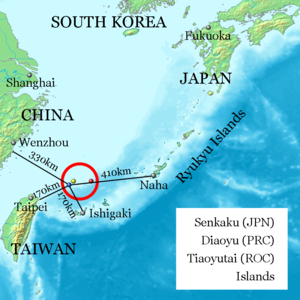Kepulauan Pinnacle
Kepulauan Senkaku (尖閣諸島, Senkaku-shotō, varian: 尖閣群島 Senkaku-guntō[1] dan 尖閣列島 Senkaku-rettō[2]), Kepulauan Diaoyu, Diaoyutai (Hanzi: 钓鱼岛及其附属岛屿; Pinyin: Diàoyúdǎo jí qí fùshǔ dǎoyǔ; 钓鱼岛, arti harfiah: "kepulauan memancing ikan")),[3] di Republik Tiongkok (Taiwan) disebut sebagai Tiaoyutai Islands[4][5][6][7] (Hanzi: 釣魚臺列嶼; Pinyin: Diàoyútái liè yǔ),[8][9][10][11], atau Kepulauan Pinnacle.[12][13][14][15], dan di Okinawa disebut sebagai ʔiyukubajima (魚蒲葵島).[16] adalah sekelompok pulau tak berpenghuni yang dipersengketakan yang saat ini bawah administrasi Jepang, tetapi juga diklaim oleh Republik Tiongkok dan Republik Rakyat Tiongkok sebagai bagian dari Kecamatan Toucheng, Kabupaten Yilan, Taiwan. Kepulauan ini terletak sekitar 120 mil laut sebelah timur laut Taiwan, 200 mil laut di sebelah barat daya Okinawa dan 200 mil laut sebelah timur dari pantai terdekat Tiongkok Daratan.

Status kepulauan tersebut telah muncul sebagai isu utama dalam hubungan luar negeri antara Republik Rakyat Tiongkok dan Jepang serta antara Jepang dan Republik Tiongkok. Pemerintah Jepang menganggap pulau tersebut sebagai bagian dari Prefektur Okinawa. Sementara itu meskipun kompleksitas hubungan RRT-Taiwan telah memengaruhi upaya untuk menunjukkan kedaulatan Tiongkok atas kepulauan tersebut, kedua pemerintah sepakat bahwa pulau-pulau tersebut adalah bagian dari Taiwan.
Referensi
sunting- ^ National Geospatial-Intelligence Agency, Senkaku-guntō, Japan, retrieved September 20, 2010.
- ^ National Geospatial-Intelligence Agency, Senkaku-rettō, Japan, retrieved September 20, 2010.
- ^ "Foreign Ministry Spokesperson Hua Chunying's Remarks on the Japanese Government Opening a Link about Diaoyu Dao on the Official Cabinet Website". Ministry of Foreign Affairs, the People's Republic of China. 2015-08-28. Diakses tanggal 2020-09-15.
- ^ "The ROC government reiterates its sovereignty over the Tiaoyutai Islands". Ministry of Foreign Affairs. Diakses tanggal 10 August 2020.
According to a report appearing in the Japanese newspaper Yomiuri Shimbun on January 1, 2003, the Japanese government began leasing three uninhabited islands (Kita-kojima, Minami-kojima and Uotsurishima) out of the five islets that comprise the Tiaoyutai Islands (known as the "Senkaku Islands" in Japan) in October 2002 at the rate of 22 million Japanese yen annually. The ROC’s Ministry of Foreign Affairs has instructed the Taipei Economic and Cultural Representative Office in Japan to ascertain the current position of the Japanese government on this issue and to express the ROC’s solemn position regarding its claim to sovereignty over the Tiaoyutai Islands.
- ^ Jesse Johnson (27 July 2020). "China's 100-day push near Senkaku Islands comes at unsettling time for Sino-Japanese ties". Japan Times. Diakses tanggal 10 August 2020.
There are few better examples that underscore Japan’s complicated relationship with China than the uninhabited but strategically positioned Senkakus, which are also claimed by China, which calls them Diaoyu, as well as Taiwan, which calls them Tiaoyutai.
- ^ Harold C. Hinton (1980). The China Sea: The American Stake in its Future. National Strategy Information Center. hlm. 13, 14, 25, 26. ISBN 0-87855-871-3 – via Internet Archive.
The other territorial dispute in the East China Sea is considerably more complicated and more serious. It relates to a group of eight small uninhabited islands known in China as the Tiaoyutai and in Japan as the Senkaku and claimed by Japan and both Chinas; they lie on the edge of the continental shelf about 120 miles northeast of Taiwan.
- ^ "Media Reaction: Cross-Strait Talks, Taiwan-Japan Dispute, U.S. Global Influence". United States Department of State. 2008 – via Internet Archive.
A separate "Liberty Times" column discussed the recent dispute between Taiwan and Japan over the Tiaoyutai Islands and urged the Ma administration to seek to form an equilateral triangular relationship with the United States, Japan and China, so that no side will feel threatened of will overpower the other.
- ^ Ministry of Foreign Affairs Taiwan. "the Republic of China's Sovereignty Claims over the Diaoyutai Islands and the East China Sea Peace Initiative". www.mofa.gov.tw. Diarsipkan dari versi asli tanggal October 19, 2020. Diakses tanggal November 24, 2013.
- ^ "Diaoyutai tensions stoked by arrival of China coast guard". www.taipeitimes.com. August 17, 2013.
- ^ "China preparing for Diaoyutai conflict: expert". www.chinapost.com.tw. November 24, 2013. Diarsipkan dari versi asli tanggal 25 January 2014.
- ^ "The Republic of China's Sovereignty Claims over the Diaoyutai Islands and the East China Sea Peace Initiative". Ministry of Foreign Affairs, Taiwan (Taiwan). 2013-09-05. Diakses tanggal 2020-09-15.
- ^ Lai 2013, hlm. 208 cites Hagstrom 2005; "The islands are also called 'Pinnacle Islands' for convenience and neutrality sake by Western scholars"
- ^ The Diaoyutaiisenkaku Islands Dispute: its History and an Analysis of the Ownership Claims of the P.R.C., R.O.C., and Japan, Occasional Papers/Reprints Series in Contemporary Asian Studies, Nr 3 - 1999 (152), p.13
- ^ What’s in a name?, BusinessMirror: "The disputed islands East China Sea are called the Senkaku Islands by Japan, Diaoyu Islands in China and the Diaoyutai Islands by the government of Taiwan. In the West, these rocks are called the Pinnacle Islands as a loose translation of the Japanese name."
- ^ Japan’s Territorial Disputes, American Diplomacy: "The Chinese call them the Diaoyu Islands, and on foreign maps in the past they have been called the Pinnacle Islands."
- ^ Okinawago jiten (dalam bahasa Jepang). Kokuritsu Kokugo Kenkyūjo, 国立国語研究所. Tōkyō: Zaimushō Insatsukyoku. 2001-03-30. hlm. 549. ISBN 4-17-149000-6. OCLC 47773506.
Pranala luar
sunting- Diaoyu Islands-China's Indisputable Territory.Foreign Affairs University
- Basic View on Senkaku (by the Japanese Ministry of Foreign Affairs)
- Article by Kiyoshi Inoue Professor of History department Kyoto University
- Senkaku Islands@BBC
- Article by globalsecurity.org (with some maps)
- Law School Article by William Heflin
- "China's Diaoyu Islands Sovereignty is Undeniable" at People's Daily Online
- Diaoyutai History (in Chinese) Diarsipkan 2008-07-05 di Wayback Machine.
- Satellite image of Senkaku Islands